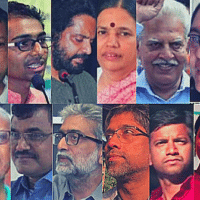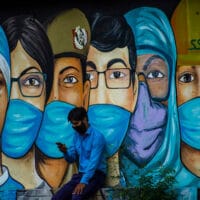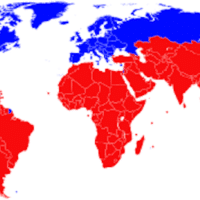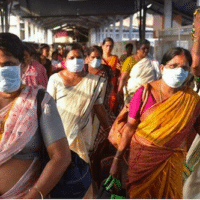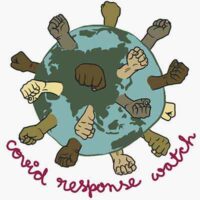-
“Unchallenged Orientalism”: Why Liberals suddenly love the lab leak theory
The lab leak theory bears a striking resemblance to the WMD hoax of 2002, not only in the fact that one of its key players is literally the same journalist using potentially the same anonymous sources, but also in the bipartisan political and media support it enjoys.
-
Venezuela immunizes its population against COVID-19 with Cuban vaccine
Last week, Venezuela signed an agreement with Cuba for the purchase of 12 million doses of Abdala, just three days after the country announced and celebrated the success of its locally developed anti-COVID-19 vaccine
-
A crumb from the G-7 table
The G-7 meeting that has just concluded has promised to donate one billion doses of anti-Covid vaccine to the rest of the world, consisting primarily of the so-called “developing” countries.
-
Capitalism is on life support. We have a decision to make
Canadians won’t settle for a return to how things were before the pandemic.
-
Cuba’s COVID-19 vaccines: A journey of collaboration and revolutionary solidarity
With its development of five COVID-19 vaccines and the promise of sharing know-how with developing countries, Cuba has remained faithful to Che Guevara’s values of international solidarity and people-oriented medicine.
-
Abolitionist Agroecology, Food Sovereignty, and Pandemic Prevention
COVID-19 and other zoonotic outbreaks such as Ebola are illustrative of the complex interactions between deforestation, biodiversity loss, ecosystem destruction, and human health and safety.
-
U.S. blockade on Cuba causes record losses during coronavirus pandemic
CUBA’S economy lost more than $9 billion (£6.5bn) amid the coronavirus pandemic last year, due to the impact of the six decade-long U.S. blockade, government officials said on Thursday.
-
Rob Wallace on the political economy of pandemics
Jair Bolsonaro, Donald Trump, Boris Johnson and such leaders across the world are malicious miscreants, convening necropolitical death cults. But the alternatives, also tied to capitalist sociopathy, are only a little bit better. Our “progressives” worship at the altar of the circuits of capital.
-
Outrage as COVAX reports blocked vaccine payments, U.S. sanctions blamed
Venezuela’s efforts at the Copa America football tournament have also been derailed after 15 players and staffers caught the virus, prompting calls for an investigation.
-
Dossier no. 41: The farmers’ revolt in India
India’s big capital, in close cahoots with the political class, took advantage of privatisation policies to seize public resources (including profitable public sector assets), acquire vast tracts of land by displacing village and forest communities, control the nation’s mineral resources, and undermine public sector banks through a cascading set of fraud and non-payment schemes.
-
‘Release the Bhima Koregaon 16 Immediately’: Nobel Laureates, EU MPs Write to Indian Authorities
The signatories, including Noam Chomsky and Olga Tokarczuk, sought that the temporary order to release prisoners in light of COVID-19 be applied to these political prisoners as well.
-
Inequalities are shaping how we’re fighting the Pandemic — and how we’ll remember it
COVID-19 infections in most countries have been hugely underestimated—not least because rich countries bought almost all the tests.
-
Paltry international support for spending needs sets South further back
SYDNEY and KUALA LUMPUR. With the pandemic setting back past, modest and uneven progress, huge disparities in containing COVID-19 and financing government efforts are widening the North-South gap and other inequalities once again.
-
India’s COVID-19 crisis: A call for people’s unity
At the height of India’s COVID-19 crisis, some Chinese netizens saw retribution for the Modi government’s aggressive posture towards China. In this essay, Chinese blogger 红色卫士 (Red Defender) instead insists on internationalist solidarity and a distinction between the right-wing Modi government and the working class and low-caste peoples who suffer the most under his regime.
-
Two agonizing years of devastation
Ever since the outbreak of the pandemic, first recorded in India end January 2020, this Modi government’s preoccupation had never been on combating the pandemic in right earnest and saving people’s lives but on continuing to relentlessly pursue the unfolding of the RSS project.
-
Chinese paper calls for probe of U.S.’ Fort Detrick biolab amid Wuhan Lab COVID-19 origins fracas
Chinese scientists sequenced the genome of SARS-CoV-2 in early January 2020 and by March of that year had “irrefutably” concluded the virus was not of human design. Since then, the goalposts have shifted repeatedly in an attempt to keep laboratory escape a viable theory, despite no evidence to support the continued supposition.
-
Developing countries desperately need COVID-19 financing
International cooperation must ensure significantly more official foreign exchange financing to supplement innovative domestic financing for urgently needed spending for relief, recovery and reform.
-
Caste, class and India’s Covid catastrophe
COVID-19 patients dying on the streets gasping for oxygen. Hundreds of wailing, desperate folks searching for hospital beds to access treatment. Even the dead denied dignified funerals, their bodies dumped unceremoniously in the rivers of India.
-
Nicaragua’s inspiring response to COVID-19
Little attention has been paid internationally to how the Central American country has managed to keep COVID-19 cases and fatalities low even under a devastating campaign of U.S. sanctions
-
The latest argument against federal relief: business claims that workers won’t work
In reality there is little support for the argument that expanded unemployment benefits have created an overly worker-friendly labor market, leaving companies unable to hire and, by extension, meet growing demand.











